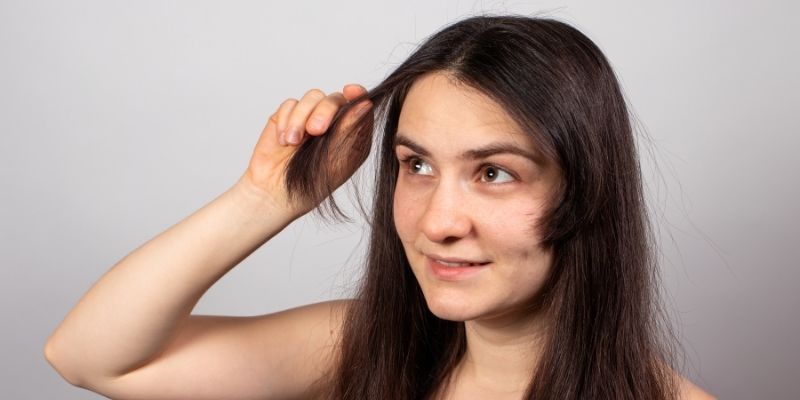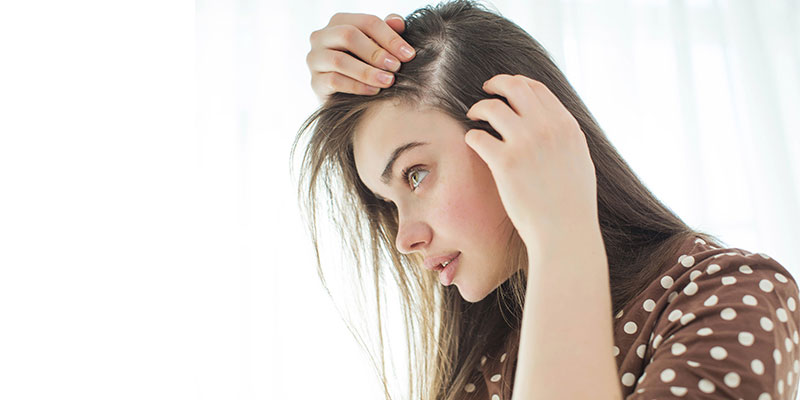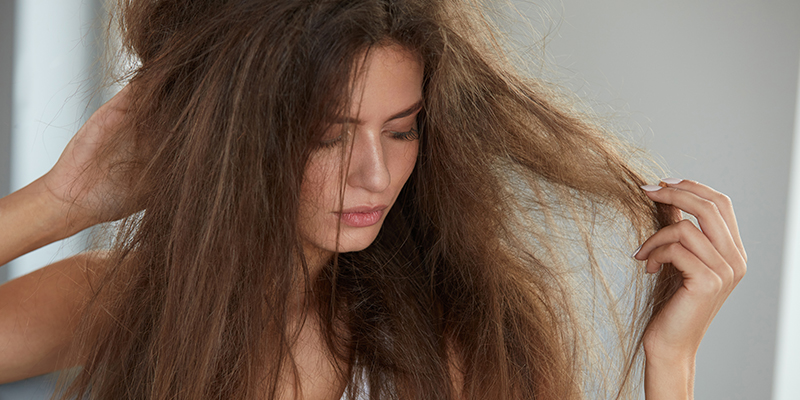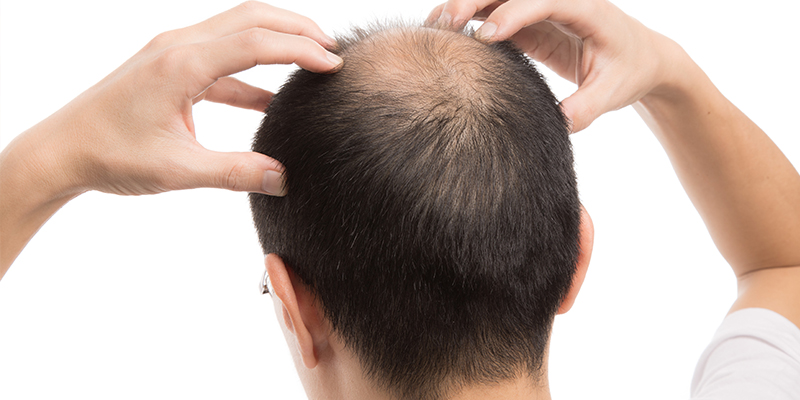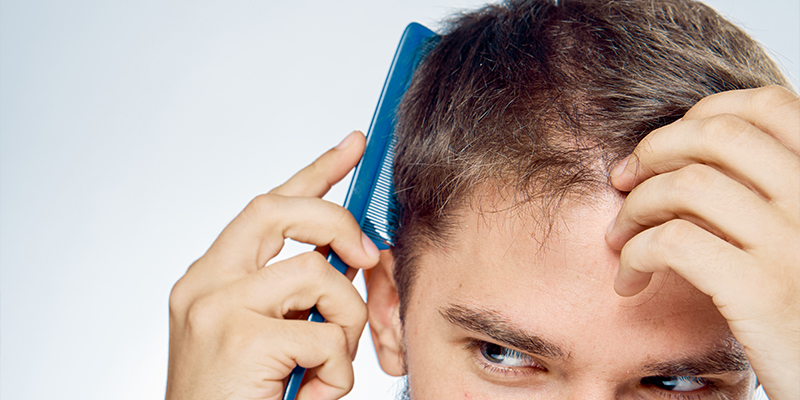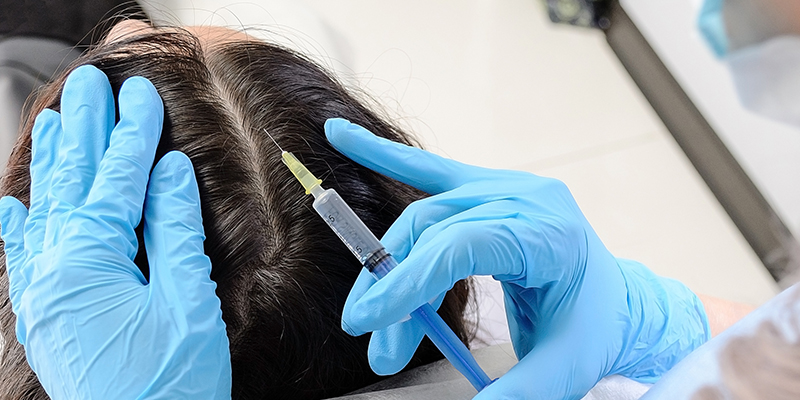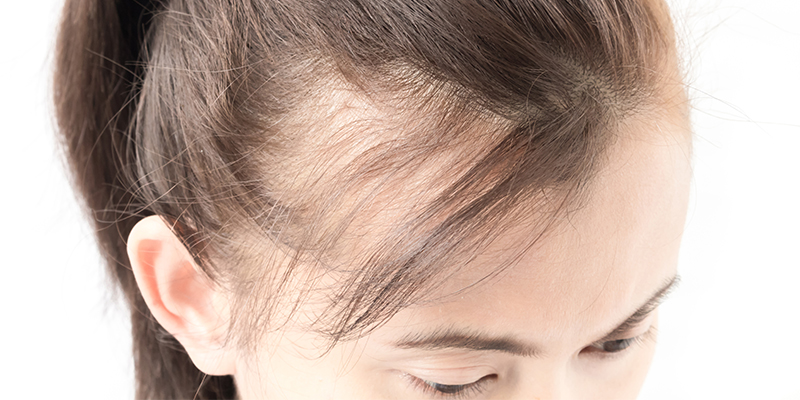Biotin For Hair Growth – Benefits & Side Effects
We often complain of hair thinning and hair fall, especially with the extremely volatile climatic conditions and the quality of water, and we seek help for our hair and skin. Then comes the need for essential vitamins and minerals which are important for the nourishment of our hair. Biotin is one such essential vitamin that has shown good results for hair growth. But, is there a way we can reverse the damage already caused and improve the health of our hair and skin conditions? Let us find out.
What Is Biotin?
Biotin or vitamin B7 is a key nutrient for the body which is needed for a healthy metabolic functioning. It is an essential water soluble B vitamin needed by our body that is used for converting macronutrients into energy and for aiding psychological functioning. It helps in getting nutrients from carbohydrates, fats and proteins. This vitamin is commonly found in a lot of food items such as meats, eggs, avocado, cauliflower, berries, fish, legumes, and mushrooms. And it is processed by gut bacteria in the body.
Why Do We Need Biotin?
Since vitamin B7 cannot be synthesized by our body, we need to consume biotin-rich foods to process this essential vitamin. Biotin is believed (but no scientific evidence suggests this) to help in strengthening nails, hair and skin. Since we need biotin to metabolize fats, proteins and carbs; it is a coenzyme for carboxylase enzymes. These help in synthesizing amino acids, creating fatty acids, and generating glucose.
How Does Biotin Help In Hair Growth?
Biotin is also known as Vitamin H for “Haar und Hout” that means “hair and skin” in German. There are studies that suggest deficiency of biotin can lead to alopecia but no studies have been concluded on the use of biotin in improving hair health.
Some scientists and dermatologists do believe that consuming biotin can improve the keratin infrastructure. Keratin is a protein that forms hair, skin and nails.
Must Read: What Are The Early Signs And Symptoms Of Hair Loss?
Symptoms of Biotin Deficiency
Though biotin deficiency is not very common as the food we consume processes this vitamin in our body. But certain signs and symptoms must be checked that suggest biotin deficiency –
- Hair thinning and hair loss
- Skin rashes (scaly red rashes) more prominent around nose and mouth
- Memory problem
- Depression
- Nausea and abdominal cramping
- Muscular pain
- Seizures
- Impaired immune functions
- More susceptive to bacterial and fungal infections
- Numbing of hands and feet
- Hallucinations
Causes of Biotin Deficiency
Biotin deficiency is not common, although, the following reasons might cause your B-7 levels to drop –
- Medications – Some medicines prevent your body from properly absorbing vitamins, these include antibiotics and anti-seizure drugs and are known to destroy the good bacteria that is present in your body, which naturally produces biotin.
- Intravenous (IV) Feeding – If for any reason, you are receiving your nutrition from an IV, then it can cause a B-7 deficiency in your body, and you may have to consume supplements till you are able to eat solid food again.
- Intestinal Problems – Chronic intestinal conditions disable your body’s ability to absorb nutrients from the food consumed. Some of these conditions are Crohn’s disease and colitis.
- Long-Term Dieting – Crash diets may have adverse effects on your body and may prevent your body from getting the basic nutrients and vitamins that it needs. Therefore, eating a balanced diet is vital for maintaining good health.
- Biotinidase Deficiency – Biotinidase deficiency is a rare disorder that prevents your body from recycling the biotin that is present in the body and removes it as waste instead. This disorder can be recognized at a very early stage because it’s symptoms are very severe (seizures, weak muscle structure, problems with breathing, hearing, vision etc.)
- Other Genetic Causes – Biotin deficiency can simply be genetic. Conditions like holocarboxylase synthetase deficiency, biotin transport deficiency, and phenylketonuria have genetic causes.
Must Read: What Are The Causes Of Hair Loss In Men & Women?
Who Is More Prone To Biotin Deficiency?
Biotin deficiency is more likely to occur in
- Pregnant women
- Patients on prolonged intravenous nutrition
- Infants on breastmilk with low biotin constituents
- Patients with inflammatory bowel disease
- People who smoke cigarettes
- People with liver ailments
Is Taking Biotin Good For You?
Currently biotin supplements are only suggested for people with proven deficiency and pregnant or lactating mothers. But for others the bacteria in the body can process the same.
The typical benefits of biotin include younger and brighter skin and non-brittle nails. Biotin is known to have vital metabolic functions and helps in addressing high blood glucose levels in people with type 2 diabetes. Research has also proved that consumption of biotin can help in decreasing insulin resistance while improving glucose tolerance, and in some cases preventing birth defects.
Biotin plays an important role in metabolism and helps in controlling alopecia, cancer, Crohn’s disease, hair loss, Parkinson’s disease, peripheral neuropathy, Rett syndrome, seborrheic dermatitis, and vaginal candidiasis treatments.
If your body is deficient in this vitamin, then this deficiency leads to hair loss, dry skin, scaly rash, dry eyes, fatigue, and even depression.
Must Read: Can You Regrow Lost Hair In Male Pattern Baldness?
Biotin Benefits for Your Hair
Biotin is not only used for making your hair look healthy, it is known to reflect the same effect on your skin and nails too. Biotin is used in oral and topical supplements to help in enriching and nourishing your hair. Biotin deficiency in the body can cause hair discolouration and thinning of hair, which is why it is important to have a biotin rich diet, or, consume biotin supplements (only after consulting a professional). Some more benefits of biotin include –
- Biotin helps in promoting hair growth.
- Biotin also adds to hair strength and volume.
- Biotin helps in preventing hair thinning and hair fall.
- Biotin may help in clearing dandruff and getting rid of dry scaly patches on the scalp.
- Biotin may also help in bringing back the lost hair sheen thus making them radiant and glossy.
How Much Is Biotin Needed For Hair Growth?
There is no recommended daily allowance for biotin as no scientific evidence exists. But around 35-70 micrograms (mcg) a day for adults is the suggested adequate intake by most experts for normal requirements. But in case of biotin deficiency this would change.
Biotin Dosage for Hair Loss
Biotin supplements can be taken to promote your hair growth and improve your health condition, but, it is important to consult a dermatologist before starting the course. It is recommended to take around 240 mcg of Biotin daily for hair growth, for people suffering from biotin deficiency. This dosage can be combined with a clinically proven supplement formula that helps in nourishing hair follicles and promoting hair growth.
Side Effects of Biotin
An excess intake of biotin will result in excess B-7 production in the body, and that is unhealthy for the body.
It is important to seek professional help before starting a course of supplements to avoid any negative effects on the body. Although there are no known adverse effects of consuming biotin, it may be hazardous due to other factors (for example, certain dietary habits cause a deficiency of biotin).
The following are the side effects that are caused by biotin –
- A high dosage can cause cystic acne.
- Increased chances of a miscarriage for pregnancies.
- Some people often suffer from allergic reactions due to an intake of biotin, these allergic reactions include:
- Tightness in the throat
- Chest pain
- Itchy Rashes
- Swelling of the face and throat
- Nausea is a common side effect.
- Research suggests that biotin has a negative interaction with certain medications, which include anti-seizure and cholesterol-lowering medications.
- Stomach cramps and diarrhoea are typically some of the common side effects that are caused by a high dosage of biotin. If the condition worsens, seek medical help for it.
How Much Biotin Should You Take For Hair Loss?
There are no recommended daily allowances for biotin, but for people suffering from biotin deficiency the daily dosage for biotin is –
- Age until 3 years – 10-20 mcg of biotin
- 4-6 years – 25 mcg
- 7-10 years – 30 mcg
- 10 and above – 30-100 mcg




